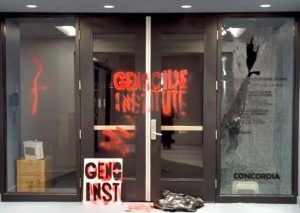There are many similarities between Indigenous and Jewish communities, says a retired senior civil servant, who urges the Jewish community to become more involved with First Nations issues.
“We have shared values. We are family-oriented and our language and culture are important,” said Hanita Tiefenbach, a former assistant deputy minister, Ministry of Aboriginal Affairs.
“There are also negative similarities, however. We have both suffered persecution and genocide, and have had our families torn apart.”
Tiefenbach, 66, a mother and grandmother, knows first-hand about families being torn apart. The daughter of Holocaust survivors, she was born in Israel, where her parents lived after surviving the war in concentration camps. Her father was held in a number of camps starting in 1939 until he was liberated by the British.
He then joined World Jewish Relief, British Jewry’s leading international humanitarian and development agency, and met her mother when they liberated her camp. After their marriage in 1947, they relocated to Marseille where they assisted in the Haganah efforts to transport survivors to Israel illegally. They finally landed in Israel in 1948, once Israel was declared a state.
“My parents’ experiences absolutely impacted my life. They taught me about survival, and how to be open and generous. They talked extensively about the hardships they went through. They dedicated themselves to helping others.”
Her parents lost their whole family, except for her father’s brother, she said. “My mother met two women in her concentration camp and became very close to them. They were essentially my aunts.”
As an Ontario civil servant, Tiefenbach held a number of senior positions in the areas of health, indigenous affairs, and intergovernmental relations. She was particularly drawn to Indigenous issues.
Multi-generational trauma, based in large part on children who were forcibly removed from their families and sent to residential schools where they often experienced neglect and abuse, has contributed to the poor social and economic conditions Indigenous people experience, both on and off reserves, she said.
“There is over-representation of Indigenous (people) in the social assistance, justice and child welfare systems. They have crowded living conditions, low high school graduation rates, higher rate of poor health—diabetes, tuberculosis—alcohol and substance abuse and suicide.”
With all these factors in mind, Tiefenbach has continued to be involved with Indigenous causes in her retirement. She is a founding member of the board of Ma’mo’weh Wii’soo’ka’tiwin Foundation, People Helping People, a health and social services agency providing care to the First Nation communities in the Kenora area in northwestern Ontario.
The foundation is dedicated to raising funds for new projects and programs that will meet a wide range of needs.
Programs include promoting life skills for Aboriginal youth, a youth mobile crisis and outreach program, and a family rookie baseball league to engage families and community members in sports and play.
The foundation also offers well-being programs including gambling addiction awareness. tobacco reduction, diabetes education, and a support program to help prevent fetal alcohol syndrome.
There are also Ontario Works life skills programs to teach people the life skills needed for employment, including conflict management, decision making, communication, problem solving and financial management.
“These services are changing lives. The issues are well known, and the communities are working hard to lift people out of their conditions. They have established innovative and effective programming to improve the well-being of the children, youth and families,” Tiefenbach said. “Government funding is not always sufficient or flexible to meet the needs of the communities.”
Tiefenbach has also sought to bring her Judaism into her concern for Aboriginal people. In 2015, she led a number of Jewish organizations to draft a Statement of Solidarity with Indigenous people, which was presented to the Truth and Reconciliation Commission at its closing ceremony in Ottawa. The signatories included Ve’ahavta, the Centre for Israel and Jewish Affairs, Canadian Council for Reform Judaism, Canadian Rabbinic Caucus, the Toronto Board of Rabbis and the Reform Rabbis of Greater Toronto.
In the statement, the participants committed to a high level of meaningful action in partnership and solidarity with the indigenous peoples of Canada.
“This statement is a call to action for Jewish Canadians to build bridges and relationships in our generation to ensure a just and equitable future for all,” the group said. “The pursuit of a just society is a fundamental concept of the core of Judaism. It is motivated by the Jewish values of compassion, sharing and repairing the world.”







